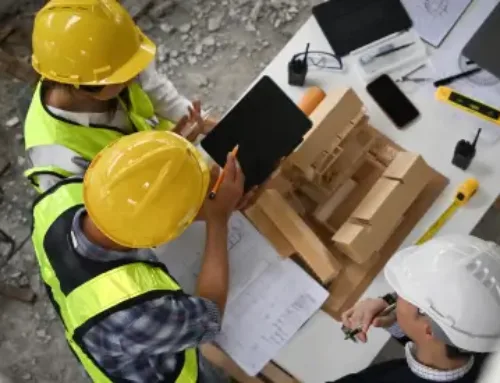
Obstacles That Minorities in Construction Face
Professional Development Resources for Minorities in Construction
Construction is one of the most lucrative and fastest-growing industries in America, but the industry has been challenged by a labor shortage. The trade skills gap in construction, which refers to the lack of skilled laborers, is largely responsible for the labor shortage seen across the industry. The labor shortage also means higher competition for all jobs, including among minorities.
Some individuals may not have the same access to training, or may not have the funds to go to school in related construction fields. This means many talented people who could make excellent additions to a construction job are overlooked. However, greater awareness of the benefits of working in construction, along with resources to help minorities enter the profession, are means of bridging the labor gap within the construction industry.
Benefits of Working in Construction
Members of different minority groups may shy away from the construction industry, but they shouldn’t because construction is an enjoyable and rewarding industry to work in. The benefits of working in construction should be available to anyone, and minorities should consider a career in the industry for the following advantages.
On-the-Job Training
Construction jobs often include some on-site training, which means new workers can learn while under the guidance of a more experienced worker. Construction is an industry where training and education opportunities are very accessible. Employers will usually give new employees significant opportunities to grow in their careers.
The construction industry offers many different alternatives for people who want to join it. The projects that come along every day require a variety of skills and strengths. While some projects may need workers who can operate heavy equipment, others may only need workers with light carpentry or painting skills. Minorities looking for work in construction might like one aspect of this industry over another. Still, regardless of what you choose, there is an opportunity available to make money doing it.
Opportunity for Travel
The construction industry is often very mobile in that, in many cases, workers are needed across the country. Construction jobs give people the chance to travel for work, which means they can get paid to see the country. Unlike employees in other industries who are usually required to live near their employer’s physical location, construction workers can travel to many different sites.
Growth Possibilities and Job Flexibility
Construction includes a wide array of jobs. On any construction site, you’ll find people of all different trades working together. Some employees do carpentry, others do concrete work, and workers also help with roofing. These workers have a variety of skills that allow them to contribute to a single project. This diversity of jobs makes the construction industry an excellent place for recruits and benefits people who have been in the industry for years because it means there is always something new available to learn.
Job Opportunities and Job Security
Construction is an industry where there are always jobs available. If someone leaves one job, they could have another construction job somewhere else within just a few weeks. Construction workers are not typically tied down to their current employers with non-compete agreements, which means they can look for better opportunities if they are not satisfied with their current work. Whether it’s better pay or a closer commute, construction workers can change jobs without much difficulty because many workers are not exclusive to one employer.
Make a Good Living
Construction jobs are typically high-paying and provide employees with room to grow their careers into something that can support a family. Depending on your position and the state you live in, the average pay for a construction worker in 2021 is $15.87 per hour.
As such, construction pay provides an attractive return on investment for those who pursue an education in construction-related fields like welding or carpentry. Many workers also use their knowledge of construction to move into management, which means they can earn even more money.
Affordability and Timely Education
Construction is an industry that does not require a college degree to get started. Many high school programs teach construction-related skills, which means it’s possible to invest in your career right out of high school. Many of these construction programs also offer scholarships and financial aid, making them even more affordable for someone who wants to do what it takes to make a good living in this industry without going into debt.
Apprenticeships are also not expensive, and in most cases, the cost of a vocational school is typically lower than a traditional four-year college. The opportunities in construction are there for anyone willing to put in the work, which means people with little money can use apprenticeships or vocational schools to get ahead.
How to Get Into Construction
There are several avenues and financial assistance options you can use to get started in construction. For example, there are trade schools that offer free apprenticeships where learners can learn valuable skills. Additionally, vocational schools focus on everything from design to engineering and help students grow their careers by learning about the latest techniques in construction. Grants and scholarships are also available.
Apprenticeships
An apprenticeship is a flexible opportunity that offers hands-on training as well as technical education. The goal is to help students get on the fast track to entry-level employment without shelling out unaffordable tuition fees.
Students who start an apprenticeship will be required to spend at least 1,000 hours on-site with their employer, working alongside them in the field. They will also need to complete technical instruction associated with the trade(s) they choose to learn. This training isn’t expensive, and admission may even be free. Some apprenticeships are also available for free or at discounted rates for minorities.
Vocational/Technical Schools
Many high school graduates consider going to a four-year college or university. However, the cost of tuition and time needed away from work has made it impractical for some students. Instead, they opt for vocational/technical schools that offer associate degrees at significantly lower costs. These schools also provide the flexibility to learn on a person’s own time and work while pursuing an education.
Career and Technical Education (CTE)
CTE offers students the opportunity to learn about everything from carpentry and bricklaying to manufacturing. Courses are available for various skills that can help students get on the path to a construction-related job or introduce them to new careers where they can use their gained knowledge.
There are thousands of secondary schools that provide CTE courses, and it is available in every state across America. Courses are designed by teachers who understand the latest construction trends and what will best prepare students for their future careers.
CTEs offer minorities the concrete skills they need to be a part of a construction company. Using this type of education, students can learn the technical skills required to enter the workforce with an apprenticeship or vocational program at an affordable price and without much debt.
Scholarships and Grants
There are many scholarships and grants available for students who want to get into construction. There is no shortage of awards across the country, and many focus on minorities. Scholarship and grant amounts vary from as little as $100 to as much as several thousand dollars.
Students should look at every opportunity that appears related to their career choice, and even those they think are not. For example, some awards focus specifically on women or students who come from low-income households that may also be interested in construction.
Scholarships range from general construction, business, and minority-focused assistance:
- Minority Construction Council (MCC) Scholarship;
- HACIA Scholarship & Education Foundation Scholarship;
- Society of Hispanic Professional Engineers (SHPE) Scholarship;
- National Action Council for Minorities in Engineering (NACME) Scholarship;
- Union Plus Grants and Scholarships;
- The Horatio Alger Association of Distinguished Americans, Inc. Scholarship.
Certifications and Licensing
Many construction careers require licensing or certification, and you have numerous options to get certified or licensed for a wide variety of skills. Certificates and licenses are essential for a career in construction because they indicate an advanced level of expertise.
You can prepare for and take the appropriate state’s test of your abilities in a specific skill or machinery operation. Certifications in various fields such as carpentry, masonry, plumbing, elevator repair, and inspection will go a long way toward getting you hired. Often you will need them for progressing your career, and you may incur penalties if you are operating without a license in certain instances.
Starting a Minority-Owned Construction Company
Starting your own business is difficult enough, and creating a construction company will be no different. There are many hurdles entrepreneurs must overcome when trying to start any business. If you are an individual who has the potential and determination to move forward with the dream of having your own construction company, then you will need to be aware of these issues before taking on this endeavor.
Business Plans
A well-defined business plan is one of the first things you will need before starting a business. A business plan for a construction company should include:
- An overview of how your construction company will be run;
- What types of jobs you intend to work on;
- Detailed information about the contracts that you plan to win;
- Management responsibilities, including projected income statements.
After this information is provided, present the business plan to financial institutions to determine if you can get a loan. Banks will carefully examine your business plan before they approve the funds you request, so you must provide them with all the necessary information.
Registering Your Business
Another initial step to gaining a foothold in the construction industry is registering your business.
Your first course of action will be establishing the legal structure of your company. For most small businesses, this means creating a limited liability company (LLC). Then, you need to get an Employer Identification Number (EIN) from the federal government or state tax office.
Registering your business can be complicated, but many resources are available online to walk you through the process. The federal government’s Small Business Association website contains several resources covering how to register your corporation or LLC, along with information on trademark registration and general legal considerations.
Minority-Owned Business Certifications
You will also need to consider how your business will be categorized. The federal government has several programs that can certify minority-owned businesses, including the SBA and the Department of Transportation’s 8(a) Business Development program. The 8(a) program is designed for socially and economically disadvantaged individuals.
Another organization that provides minority-owned business certifications is the National Minority Supplier Development Council (NMSDC), a networking and outreach organization.
Additionally, the Department of Transportation’s (DOT) Disadvantaged Business Certification Program helps develop women and minority-owned businesses that provide products or services to the public transportation industry.
Funding Your Minority-Owned Construction Business
Another concern for many small business owners is how to access capital. Minorities have several options for funding their business, including microloans, traditional business loans, and grants.
It can be difficult for some just getting started to access capital as their options may be limited. Minorities may have more difficulty gaining access to funding if they have fewer financial resources or have been historically discriminated against.
The U.S. Chamber of Commerce offers a list of funding options for minority-owned businesses, but be aware there are a great many applicants and popular programs are competitive. While this is difficult, you can be awarded funding.
Managing Your Minority-Owned Construction Business
Whether you decide to start your corporation, LLC, or sole proprietorship, you must decide on the best way to manage the company.
Additionally, minorities have the same challenges as other small business owners in handling administrative duties and staying organized. This can be difficult for many small businesses, but several helpful resources can assist you with this, like bookkeeping software and an online filing system.
Managers of a business will also need to understand the stipulations of working in and owning a construction business, including:
- Licensing;
- Worker bonds;
- General liability insurance;
- Incorporating your business (if necessary);
- Where to obtain surety bonds.
Construction businesses will require extra paperwork and insurance for bidding, liability, safety, and more.
Resources for Minority-Owned Firms and Companies
There are many ways to pursue a career in construction, and there are also many different types of companies and organizations you can look into. For these businesses to have an easier time starting up and growing, they will need to do their research to succeed.
Publications for Minority-Owned Businesses
Prospective and current minority business owners will need to stay current in the world of construction. One way for them to do this is to access publications for minority-owned business organizations. Some major publications that are available to read online include:
- National Black Chamber of Commerce;
- U.S. Pan Asian American Chamber of Commerce;
- U.S. Hispanic Chamber of Commerce;
- American Indigenous Business Leaders;
- National Association of Minority Contractors;
- National Minority Supplier Development Council;
- National Association of Women Business Owners.
Minority-Owned Business Associations and Resources
Minority-owned businesses often belong to associations with similar missions. These organizations provide networking opportunities, seminar series, industry updates, and more. Here are just a few of the many associations available:
- The National Minority Business Council;
- National Hispanic Business Group;
- The Asian Business Association;
- United States Black Chambers (USBC);
- United States Hispanic Chamber of Commerce (USHCC);
- United States Minority Chamber of Commerce.
Professional Associations and Conferences
Construction professionals looking to further their knowledge should consider conferences for individual trades, associations related to their job title, or other industry-specific organizations. Here are just a few of the many available:
- National Association of Minority Contractors (NAMC);
- National Association of Black Women in Construction, Inc. (NABWIC);
- Minority Construction Council of America;
- Associated Builders and Contractors (ABC).





